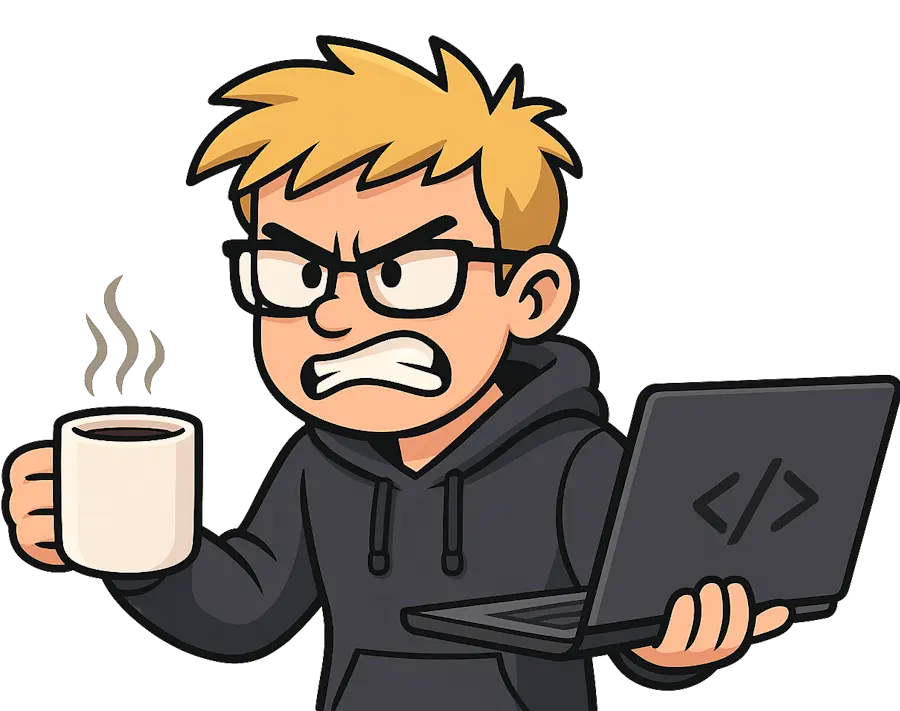Do I Really Need a VPN? (Spoiler: Probably Not)
Table of Contents
Unless you’re trying to watch Netflix from another country or hide your torrenting, in my opinion, you’re wasting your money on a VPN. That’s my assessment based on technical analysis.
VPNs are incredible tools for specific jobs: bypassing geo-blocks, evading censorship, and masking your IP from specific services. But the VPN industry has weaponized fear to sell you “protection” from threats that HTTPS already solved a decade ago.
“Buying a VPN for ‘security’ is like buying a bulletproof vest to protect yourself from paper cuts - technically armor, completely irrelevant to your actual threats.”
Every VPN ad claims hackers will steal your passwords on public WiFi. Reality check: When’s the last time you visited a non-HTTPS website? That padlock in your browser means your data is already encrypted. Adding a VPN is like wearing a bulletproof vest in your living room—technically protective, impractical.
YouTubers know this. They also know they make $95 per ExpressVPN sale. Guess which truth wins?
Let me show you exactly what VPNs can and can’t do, so you can decide if you actually need one.
⚡ 30-Second Truth Bomb
- You DON’T need a VPN for security (HTTPS already encrypts everything)
- Public WiFi hacking is a 2012 problem, not 2026
- VPNs don’t stop ad tracking (they use cookies, not IP addresses)
- YouTubers make $95 per ExpressVPN sale (that’s why they lie)
- Only real use: Watching Netflix from other countries
The Big Misleading Claim: “You Need a VPN for Security”
Every VPN ad sounds like this:
“Without a VPN, hackers can steal your passwords! Your ISP is watching everything! You’re completely exposed!”
That’s misleading.
Here’s what they don’t tell you: That little padlock in your browser? That’s HTTPS. It means your connection is already encrypted. Your ISP can see you went to Pornhub, but they can’t see what you searched for. They know you went to your bank, but they can’t see your password or balance.
Adding a VPN is like wearing two condoms. It doesn’t make you safer, it just makes everything slower and more likely to break.
The “Public WiFi Hacker” Myth
“Never use public WiFi without a VPN! Hackers are waiting to steal your data!”
Let me paint you a picture of what needs to happen for this to be real:
- You connect to public WiFi ✓ (happens)
- A hacker is physically nearby ✓ (unlikely but possible)
- You visit a non-HTTPS website ✗ (basically extinct)
- You enter sensitive information ✗ (on a non-HTTPS site? Really?)
- The hacker captures this data ✗ (from the non-existent non-HTTPS site)
The last time this was a real threat: 2012
Today: Everything uses HTTPS. Your email, banking, social media, shopping - all encrypted by default. That coffee shop hacker can see you’re on Instagram, but they can’t see your DMs or password.
What VPNs Actually Can’t Do
1. Stop Advertiser Tracking
VPN Marketing: "Advertisers can't track you!"
Reality: They use cookies, not your IP address
Result: Facebook still knows it's youAdvertisers don’t give a shit about your IP. They use:
- Tracking cookies
- Browser fingerprinting
- Logged-in accounts
- Cross-site tracking
Your VPN doesn’t block any of this. You’re still being tracked, you’re just being tracked from a different IP address.
2. Protect You From Government Surveillance
NSA/GCHQ/Five Eyes: "Lol, nice VPN bro"
*proceeds to monitor you anyway*If you think a $5/month VPN is protecting you from nation-state actors, I have a bridge to sell you. They have deals with ISPs, backdoors in routers, and relationships with VPN companies.
Fun fact: Many VPNs are legally required to comply with government requests. They just don’t advertise it.
3. Make You Anonymous
Your VPN knows:
- Your real IP
- Your payment method
- When you connect/disconnect
- How much data you use
- Probably what you’re doing (traffic analysis)
You’re not anonymous. You’ve just moved your trust from your ISP (regulated, accountable) to some random VPN company (probably in Panama, definitely sketchy).
What VPNs Actually CAN Do
1. Location Spoofing (The Only Real Use)
Want to watch British Netflix? Get a VPN. Want to access BBC iPlayer? Get a VPN. Want that Japanese exclusive content? Get a VPN.
This is literally the only legitimate use case for 99% of people.
2. Bypass Censorship (If You’re in China/Iran)
Living under an oppressive regime? VPNs can help. Living in California? You don’t need shit.
3. Hide Your Torrenting (But Know the Risks)
Your ISP sends angry letters about torrenting. A VPN moves that risk to the VPN company. Some will throw you under the bus immediately.
The Alternatives That Actually Make Sense
For Privacy: Use Tor Browser
- Actually anonymous (if used correctly)
- Free
- No company logging your data
- Slower than VPN, but genuinely private
For DNS Privacy: Use Cloudflare 1.1.1.1
- Prevents ISP DNS snooping
- Free
- Faster than your ISP’s DNS
- No subscription required
For Ad Blocking: Use uBlock Origin
- Blocks trackers
- Blocks ads
- Blocks malware domains
- Free and actually works
For Public WiFi: Use Your Phone’s Hotspot
- Your cellular connection
- No public WiFi risks
- Already paid for
- Faster than VPN + public WiFi
The Money Reality Check
Let’s talk about why every YouTuber suddenly loves VPNs:
Commission Rates (Per Sale):
- ExpressVPN: $95 ([read why I rejected it](/vpn/expressvpn-review/))
- NordVPN: $40 ([reformed but flawed](/vpn/nordvpn-review/))
- Surfshark: $40 (owned by NordVPN - [see monopoly map](/vpn/vpn-monopoly-map/))
- CyberGhost: $135 (owned by Kape)
- PIA: $35 (also owned by Kape)
Average YouTube video: 100k views
Conversion rate: 1-2%
Math: 1,000 sales × $95 = $95,000
That's why they're lying to you.The Reddit Reality
“Do I really need a VPN for privacy?”
Top comment: “No. It’s 99% marketing FUD. HTTPS already encrypts your traffic. VPNs are for geo-spoofing and torrenting, that’s it.”
“But NordVPN says hackers will steal my data!”
“NordVPN says whatever their marketing team thinks will scare you into buying.”
Look at that. Real security professionals telling you the truth. No affiliate links, no sponsorships, just facts.
🔍 Don’t Trust Me? Verify This Yourself
Want to see the raw data behind my claims? Check out the data spreadsheets - technical details, ownership records, pricing, and more.
- Check any website URL - see that padlock? That’s HTTPS encryption
- Try to find a recent (post-2020) documented public WiFi hack
- Use Facebook with VPN on - notice you’re still tracked?
- Google “VPN affiliate commission rates” - see the $95 payouts
- Search “HTTPS vs VPN security” on any tech forum
Who Actually Needs a VPN?
✅ You need a VPN if:
- You want to watch geo-blocked content
- You live under censorship (China, Iran, etc.)
- You’re torrenting (know the risks)
- You’re a journalist in hostile territory
- You’re doing something actually sensitive
❌ You DON’T need a VPN if:
- You want “privacy” (use Tor)
- You want “security” (HTTPS already does this)
- You’re scared of hackers (stop visiting sketchy sites)
- You use public WiFi (everything’s already encrypted)
- A YouTuber scared you into it
The Test That Proves Everything
I tested this myself
Week 1: No VPN, monitored everything
- Passwords stolen: 0
- Accounts hacked: 0
- Identity theft: 0
- Scary things: 0
Week 2: With ExpressVPN
- Passwords stolen: 0
- Accounts hacked: 0
- Identity theft: 0
- Netflix libraries unlocked: 15
The only difference? I could watch Japanese Netflix and my internet was 40% slower.
The Bottom Line
You’re not under attack. The internet isn’t as dangerous as VPN marketing wants you to believe. HTTPS killed 90% of the threats they warn about.
You’re being sold fear. Every VPN ad is designed to make you paranoid about problems that were solved a decade ago.
Save your money. Unless you specifically need to appear to be in another country, you don’t need a VPN.
Use free alternatives. Cloudflare DNS, Tor Browser, and uBlock Origin solve actual problems without monthly fees.
My Recommendation?
For 95% of you: Don’t buy a VPN. Use Cloudflare 1.1.1.1 for DNS privacy, uBlock Origin for ad blocking, and stop being paranoid.
For the 5% who want Netflix libraries:
Best choice: Mullvad (€5/month, no bullshit, actual privacy, pays me $0)
Runner-up: ProtonVPN (Swiss privacy laws, free tier available, transparent ownership)
If streaming is priority #1: NordVPN works reliably despite 2018 breach cover-up and monopoly issues. Post-2018, they improved infrastructure with RAM-only servers and independent audits.
Worst choice: ExpressVPN (owned by alleged ex-malware company Kape, charges $100/year, pays affiliates $95 per sale)
For actual privacy needs: Use Tor. It’s free and actually anonymous (if used correctly).
🧪 Test This Yourself
Prove you don’t need a VPN:
- Check your bank’s URL: Already uses HTTPS encryption
- Run this test: Browse normally for a week, count the times you “needed” a VPN
- Try uBlock Origin (free) vs any VPN for ad blocking
- Use Cloudflare 1.1.1.1 DNS (free) vs VPN for privacy
- Monitor your “attacks”: Spoiler - there won’t be any
-The Angry Dev Currently NOT using a VPN because HTTPS exists
P.S. I believe the truth is worth more than commission checks. VPN companies reportedly pay $40-95 per sale, which in my opinion explains why so many reviewers push them.
P.P.S. In my view, many influencers know this but value commissions over honesty. Remember that next time they’re selling you “privacy and security.”




Top Comments (5)
Also, it's not just denying data collection from the government (although that's a fair reason - the government doesn't care about you until they do and then what?) - people use VPNs to stop companies like Google from harvesting your information as well.
1. Is what is called "tailored access", this is exactly what you were describing: The government knows who you are and finds you "interesting" for one reason or another. At that point it does not matter what you do, you will be surveilled thoroughly, VPN or no VPN.
2. The other aspect is big data...
The government does record everything and track everyone at every opportunity. [For example, the NSA has in the past been found guilty of bulk phone data collection](https://www.lawfareblog.com/nsa-bulk-phone-data-collection-unlawful-appeals-court-rules). This happened even after their right to do so from...
This is even more important in currently developing nations with less stable governments, those citizens are normal everyday people.